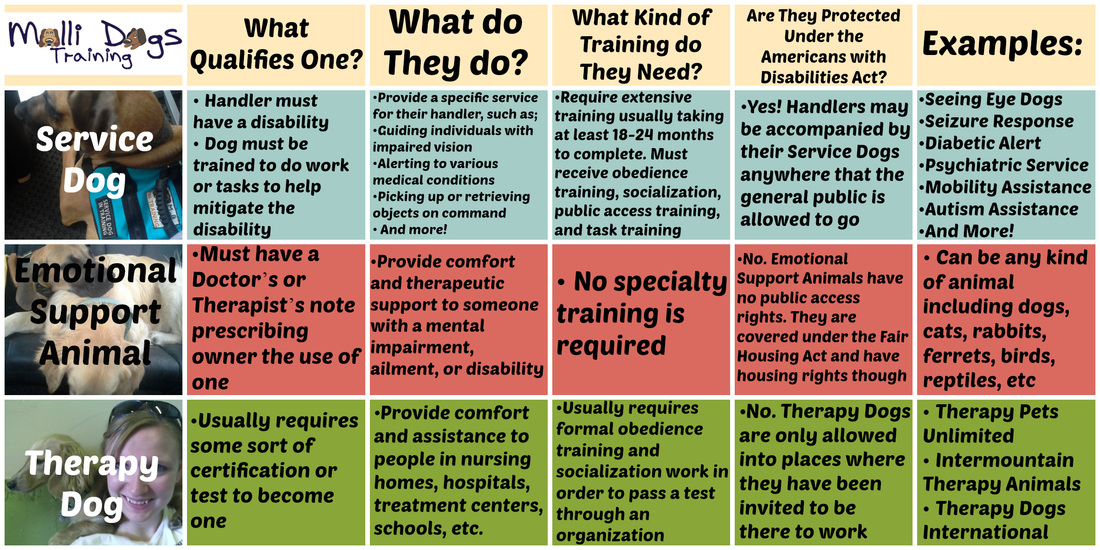Service Dog
There are two major qualifiers of a Service Dog.
First; the handler must have a disability. If you do not have a disability you do not have the legal right to be accompanied by a Service Dog.
Second; the dog must be work or task trained to do something that aids with that aids and directly relates to that disability. If the dog does something on it's own, even if it is super helpful, without the actual training it does not qualify as a task. So if, for example, your dog starts alerting to your seizures, that does not suddenly make your dog a Service Dog. You must take those alerts mold them into something you want, such as teaching the dog to paw your leg or something whenever it starts alerting.
Businesses may ask if the dog is a Service Animal required because of a disability. They may then ask what the dog has been trained to do to assist you. They may not ask about your disability, they may not ask for a demonstration of tasks, and they may not ask for training certificates, ID, or proof of disability. If your dog is out of control, however, and you fail to take action to get him or her under control, the business has every right to ask you to remove the dog from the premises (they must still allow you without the dog). This includes but is not limited to barking (unless the dog is barking to alert to a medical condition), defecating or urinating, growling or behaving aggressively, harassing others, and damaging property. They may not ask you to leave if someone nearby is allergic or afraid of dogs. The other individual must be accommodated in another way. Each incident is handled on a case-by-case basis, so you are welcome to return another day and try again.
While there are a lot of different "certifications" out there that offer to certify your dog as a Service Dog, none of them are required in order for your dog to be a Service Dog, none of them will make your dog a Service Dog if you do not meet the two above qualifying factors, and none of them are officially recognized under ADA law.
The laws can get sticky with landlords, employers, schools, etc. so make sure you do your research before obtaining a Service Dog.
Therapy Dog
While certification is not required in order for your dog to be a Therapy Dog, most businesses will require your dog to have some sort of certification in order to allow your dog to work there. They have the right to require this if they wish and can even require a specific certification should they choose.
Other working dogs, such as Police Dogs, Rescue Dogs, and Military Dogs, follow similar restrictions. Police, Fire, and Military handlers may have these dogs with them in public places if the dogs are actively working. When off-duty, however, handlers do not have any legal right to bring these dogs into public places.
Emotional Support Animal
An ESA is NOT a Service Animal. The individual does NOT have the right to have an ESA with him or her in public places.
Under the Fair Housing Act, an individual with an ESA has the right to keep this animal in the home regardless of a landlord's pet rules (landlords who own 4 rental properties/units or less are exempt form this), so long as the individual can provide proper documentation (a doctor's or mental health professionals note) confirming the disability and recommending the individual the use of an ESA. The landlord may not charge pet fees, but he or she may hold the individual responsible for any damages done by the ESA. .
As of January 7, 2021, ESA's are no longer allowed on planes.
While no specialty training is required in order for your dog to be an ESA, if the dog is a nuisance (barks uncontrollably, harasses other tenants, etc), is aggressive or a danger in any way, or is overly destructive (causes damage that you cannot afford to replace yourself) the landlord can require removal of the ESA from the premises.
Just as with Service Dogs there is no actual certification required in order for your dog to be and ESA and without a mental health disability there is no certification that can turn your dog into an ESA.
Questions?
Contact the Federal Housing Administration (FHA) for information about working dogs in housing situations.
Contact the Utah District Attorney's Office for specific information regarding Utah law and working dogs or to learn how to file a complaint against a business, landlord, or employer.


 RSS Feed
RSS Feed